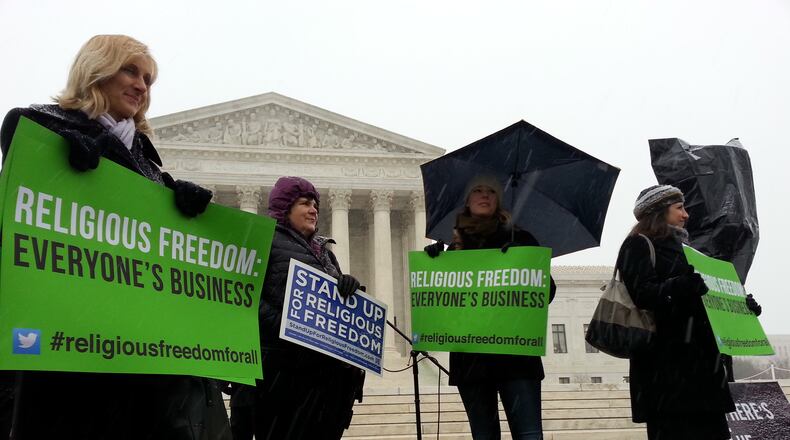Justices Elena Kagan, Sonia Sotomayor and Ruth Bader Ginsburg seized on the argument that the law does not force any company to violate its religious beliefs by forcing it to offer contraceptives. Instead, the companies can choose not to offer insurance and instead pay a $2,000-per-worker tax or penalty.
The law is “not saying you must do something that violates your religion,” Kagan said. “It’s giving you a choice.’’
With the court deeply divided, the arguments seemed aimed at winning the pivotal vote of Justice Anthony Kennedy. And while comments by justices during oral arguments can often be misleading, Kennedy may have tipped his hand when he asked why allowing companies to choose between insuring its workers or paying a tax is “a problem?”
“Let’s assume that the cost of providing insurance is roughly equivalent to the $2,000 penalty,’’ Kennedy said. “How is the employer hurt? He can just raise the wages.’’
The argument highlighted a collision between two fundamental rights – a federal guarantee of religious freedom and a woman having affordable access to the safest and most effective birth control devices.
The justices, who are expected to issue a ruling by mid-summer, must resolve a conflict between two lower federal courts. They have to decide whether a 1993 federal law declaring that “the government shall not substantially burden a person’s exercise of religion,’’ was meant to cover for-profit corporations.
Last year the U.S. 3rd Circuit Court of Appeals in Philadelphia ruled that Conestoga Wood Specialties of Pennsylvania had to comply with the contraceptive mandate even though the company’s owners are Mennonite Christians and claim it violates their religious beliefs.
But in a separate decision last year, the U.S. 10th Circuit Court of Appeals ruled that the 1993 law allows Hobby Lobby, a nationwide craft chain store from Oklahoma City, and Mardel, a Christian bookstore chain owned by Hobby Lobby’s executives, to decline to offer four of the 20 contraceptives approved by the U.S. Food and Drug Administration.
The argument attracted two of the best known legal minds in the United States. Paul Clement, who served as solicitor general under President George W. Bush represents Hobby Lobby and Conestoga, while Donald Verrilli, the solicitor general for the Obama administration, argued on behalf of the federal government.
Clement attempted to deflect the idea that companies have a choice, saying, “it’s going to very much hurt Hobby Lobby if all of the sudden it doesn’t provide health care to its employees. And in order to compensate for that, it would have to increase the wages.’’
Chief Justice John Roberts and Justices Antonin Scalia and Samuel Alito seemed receptive to that argument, with Roberts saying he “thought that part of the religious commitment of the owners was to provide health care for its employees.’’
“That is true, Mr. Chief Justice,’’ Clement responded.
But Sotomayor struck back, saying “the average price of providing insurance for a single person is $4,000 and it’s $12,000 for a family,’’ which is far more money than a $2,000 penalty.
Kagan also warned that a ruling in favor of the two companies could prompt company officials to claim religious objections to laws on the minimum wage, family leave, child labor and sex discrimination, adding that the courts “would see religious objectors come out of the woodwork with respect to all these laws.’’
Outside the Supreme Court, several hundred demonstrators on both sides of the controversy waved signs and chanted slogans. One sign depicted a Bible and said, “This is not a health care plan.” But another sign said, “God’s law comes first.”
Judy Marie Johnson of Charlottesville, Va., who said she has been attending such demonstrations for five decades, literally broke into song to share her views about how she, and not the President or the preacher, should have control over her body.
Kartharine Bodde of the New York branch of the American Civil Liberties Union said she traveled to Washington to underscore the fundamental right for women’s health care.
Kim Van Dyke of southeastern New Mexico, who said she was in nursing for 28 years, journeyed to the nation’s capital because, “I am pro-life and I believe that life is worth fighting for.”
Margaret Keeler of Rockville., Md., said the Hobby Lobby case is important because for the first time Americans are being asked to violate their religious beliefs by a government mandate.
(Darrel Rowland of the Columbus Dispatch contributed to this story.)
About the Author
